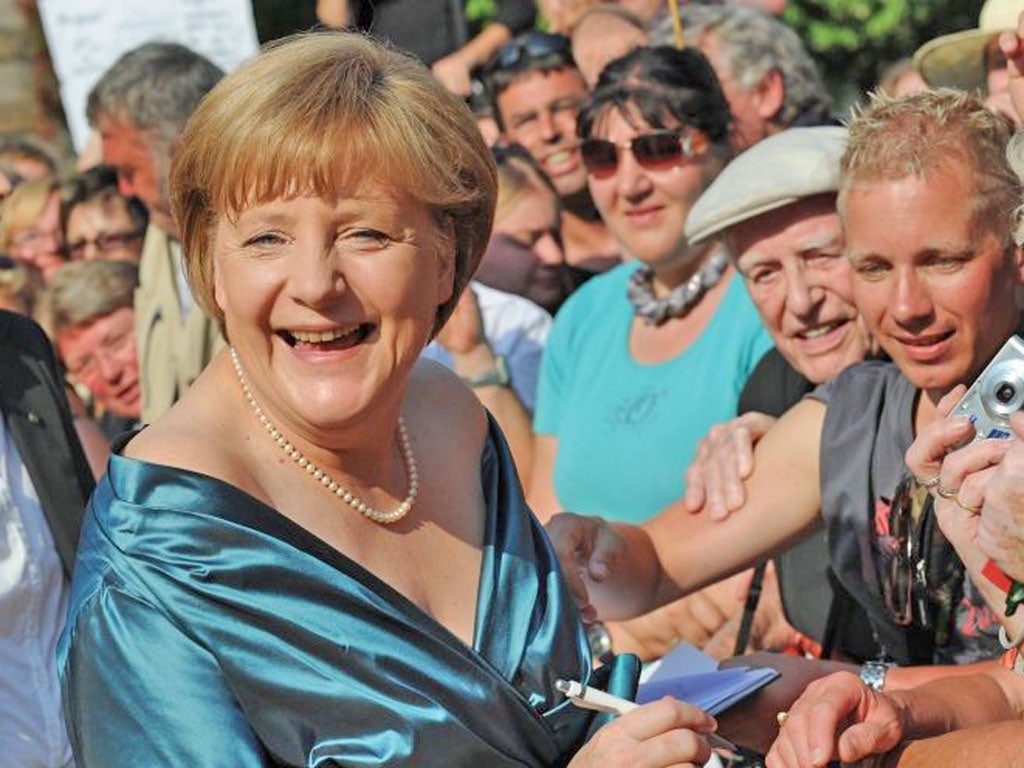Angela Merkel returns from holidays and wades straight into eurozone row
Chancellor's senior ally warns Germany will veto next Greek aid package if reforms are not pushed through

Your support helps us to tell the story
From reproductive rights to climate change to Big Tech, The Independent is on the ground when the story is developing. Whether it's investigating the financials of Elon Musk's pro-Trump PAC or producing our latest documentary, 'The A Word', which shines a light on the American women fighting for reproductive rights, we know how important it is to parse out the facts from the messaging.
At such a critical moment in US history, we need reporters on the ground. Your donation allows us to keep sending journalists to speak to both sides of the story.
The Independent is trusted by Americans across the entire political spectrum. And unlike many other quality news outlets, we choose not to lock Americans out of our reporting and analysis with paywalls. We believe quality journalism should be available to everyone, paid for by those who can afford it.
Your support makes all the difference.The German Chancellor Angela Merkel returned from holiday yesterday to face a dramatically deepening euro crisis and threats from her senior ministers that Germany would veto the next Greek aid package at the start of what was billed as the most decisive 12 months of her political career.
Ms Merkel had tried to escape the euro's interminable problems by going hiking in the Austrian South Tyrol, visiting the Bayreuth music festival and spending a few days at her cottage in the east German countryside.
But on her return to Berlin yesterday she was brought back to reality with a bump by a reminder of the worsening crisis and her government's growing doubts about Greece's ability to remain in the eurozone.
Michael Fuchs, her party's deputy parliamentary leader, put the writing on the wall in an interview with the Handelsblatt newspaper. He said Germany would veto the next Greek aid package if the country proved unable to keep to its reform agenda. "Germany has a right to veto. If we are convinced that Greece is not meeting its obligations, we will make use of that veto," he insisted.
Mr Fuchs suggested that Greece could remain within the European Union even if it left the single currency bloc and said that the EU could then set up a "sort of Marshall Plan" to help Athens cope with the reintroduction of the drachma . He said he firmly rejected the idea of further European Central Bank (ECB) help for Greece because it could weaken the incentive to reform and created problems in other eurozone crisis countries.
His comments echo public opinion. According to the latest polls, 54 per cent of the German electorate opposes further aid for ailing eurozone countries. Within Ms Merkel's ruling coalition, opposition to further aid for Greece has also been growing steadily.
Philipp Rösler, the leader of Ms Merkel's coalition partners, the liberal Free Democratic Party, recently declared that there were no longer "any great fears" about Athens leaving the eurozone. A political grouping of Free Democrat finance experts yesterday published a paper outlining plans for a Greek eurozone exit. Markus Söder, the Bavarian Finance Minister and a senior member of the Bavarian conservatives, the sister party to Ms Merkel's Christian Democrats, raised eyebrows by demanding that Germany "make an example" of Greece and banish the country from the eurozone. Further aid for Athens would be like "pouring water on to the desert", he insisted.
The mounting hostility towards Greece was compounded by figures published yesterday which showed the country's economy had contracted by 13 per cent over the past two years. There were also reports that all major German banks had made preparations for a Greek eurozone exit. "The big banks did their homework some time ago," said Bernd Richter, a banking expert with Capco consultants, "For any bank that is not prepared, the consequences would be painful," he added.
Many analysts believe the Greek crisis will move into its most critical phase next month when the so-called "Troika" comprising representatives from the International Monetary Fund, the EU and the ECB returns to Athens to assess the country's reform progress. Its conclusions will determine whether Greece obtains its latest €30bn tranche of rescue funding.
Next month, Germany's constitutional court will also deliver a crucial verdict determining whether the terms of the euro rescue fund known as the European Stability Mechanism are consistent with German law. A "no" verdict could seriously undermine attempts to save the single currency.
For Ms Merkel, the crisis is approaching its climax at the start of an election year and as her government faces mounting pressure from opposition parties to back structural reforms as well as fiscal discipline in the worst-affected EU member states. Her government also faces increasing difficulties over implementing its plans to phase out nuclear power.
Ms Merkel's coalition goes to the polls in September next year and, while the Chancellor is riding high in terms of personal popularity, the weakness of her Free Democrat coalition partners means that it is far from certain that her government will be returned to power. Her best chance may rest on becoming head of a grand coalition government consisting of her conservatives and the Social Democrats.
Der Spiegel magazine concluded at the weekend that Ms Merkel faces "the most decisive months in her career as Chancellor".
Join our commenting forum
Join thought-provoking conversations, follow other Independent readers and see their replies
Comments